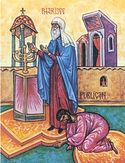

| Previous day | Next day |
| Old Style
February 8
|
Sunday |
New Style
February 21
|
| Sunday of the Publican and the Pharisee. Tone 5. | Fast-free period.
|
![]() Great-martyr Theodore Stratelates (“the General”) of Heraclea (319).
Great-martyr Theodore Stratelates (“the General”) of Heraclea (319). ![]() Prophet Zachariah (ca. 520 b.c.).
Prophet Zachariah (ca. 520 b.c.).
St. Sava II, archbishop of Serbia (1269). Sts. John and Basil, of the Kiev Caves. St. Lyubov of Ryazan, fool-for-Christ (1921).
Martyr Conitus of Alexandria (249). St. Agathangelus, bishop of Damascus (ca. 325). St. Macarius, bishop of Paphos on Cyprus (Gr. Cal).
Repose of Schema-abbot Theodore of Valaam (1937).
Thoughts for Each Day of the Year
According to the Daily Church Readings from the Word of God
By St. Theophan the Recluse

Sunday of the Publican and the Pharisee (33rd). [II Tim. 3:10–15; Luke 18:10–14]
Yesterday the Gospel reading taught us persistence in prayer, and now it teaches humility, or a feeling of having no right to be heard. Do not assume that you have the right to be heard, but approach prayer as one unworthy of any attention, allowing yourself only the boldness needed to open your mouth and raise up your prayer to God, knowing the Lord’s boundless condescension toward us poor ones. Do not even allow the thought to come to your mind, “I did such and such—so give me such and such.” Consider whatever you might have done as your obligation. If you had not done it you would have been subject to punishment, and what you did is actually nothing deserving reward; you did not do anything special. That Pharisee enumerated his rights to be heard, and left the church with nothing. The harm is not that he had actually done as he said, for indeed he should have done it. The harm is that he presented it as something special; whereas, having done it he should have thought no more of it. Deliver us, O Lord, from this sin of the Pharisee! One rarely speaks as the Pharisee in words, but in the feelings of the heart, one is rarely unlike him. For why is it that people pray badly? It is because they feel as though they are just fine in the sight of God, even without praying.






